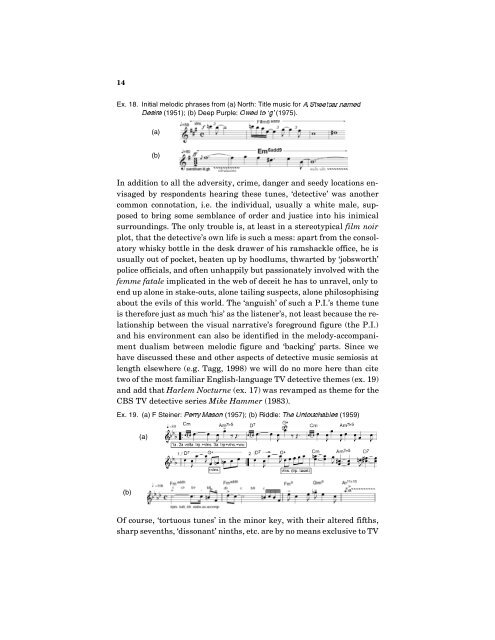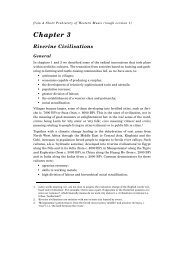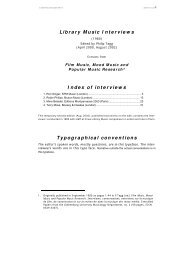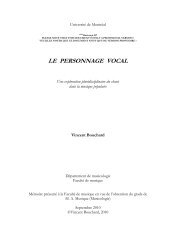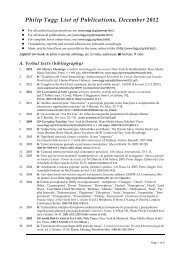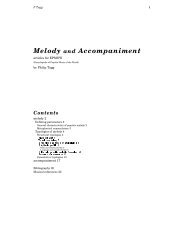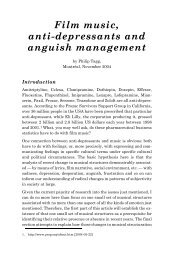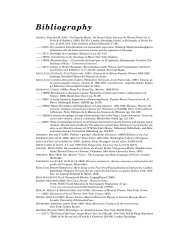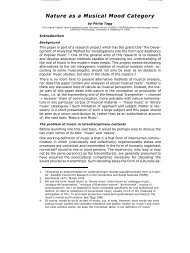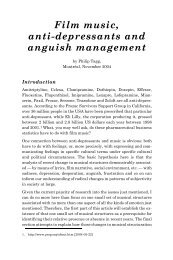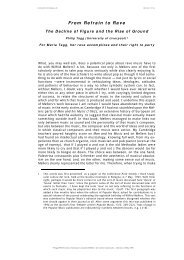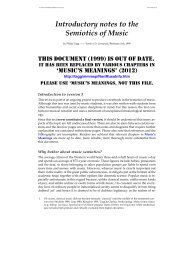Create successful ePaper yourself
Turn your PDF publications into a flip-book with our unique Google optimized e-Paper software.
14<br />
Ex. 18. Initial melodic phrases from (a) North: Title music A Streetcar named<br />
for<br />
(1951); (b) Deep Purple: Owed to ‘g’ (1975).<br />
Desire<br />
In addition to all the adversity, crime, danger and seedy locations envisaged<br />
by respondents hearing these tunes, ‘detective’ was another<br />
common connotation, i.e. the individual, usually a white male, supposed<br />
to bring some semblance of order and justice into his inimical<br />
surroundings. The only trouble is, at least in a stereotypical film noir<br />
plot, that the detective’s own life is such a mess: apart from the consolatory<br />
whisky bottle in the desk drawer of his ramshackle office, he is<br />
usually out of pocket, beaten up by hoodlums, thwarted by ‘jobsworth’<br />
police officials, and often unhappily but passionately involved with the<br />
femme fatale implicated in the web of deceit he has to unravel, only to<br />
end up alone in stake-outs, alone tailing suspects, alone philosophising<br />
about the evils of this world. The ‘anguish’ of such a P.I.’s theme tune<br />
is therefore just as much ‘his’ as the listener’s, not least because the relationship<br />
between the visual narrative’s foreground figure (the P.I.)<br />
and his environment can also be identified in the melody-accompaniment<br />
dualism between melodic figure and ‘backing’ parts. Since we<br />
have discussed these and other aspects of detective music semiosis at<br />
length elsewhere (e.g. <strong>Tagg</strong>, 1998) we will do no more here than cite<br />
two of the most familiar English-language TV detective themes (ex. 19)<br />
and add that Harlem Nocturne (ex. 17) was revamped as theme for the<br />
CBS TV detective series Mike Hammer (1983).<br />
Ex. 19. (a) F Steiner: Perry Mason (1957); (b) Riddle: The Untouchables (1959)<br />
(b)<br />
(a)<br />
(a)<br />
(b)<br />
Of course, ‘tortuous tunes’ in the minor key, with their altered fifths,<br />
sharp sevenths, ‘dissonant’ ninths, etc. are by no means exclusive to TV


